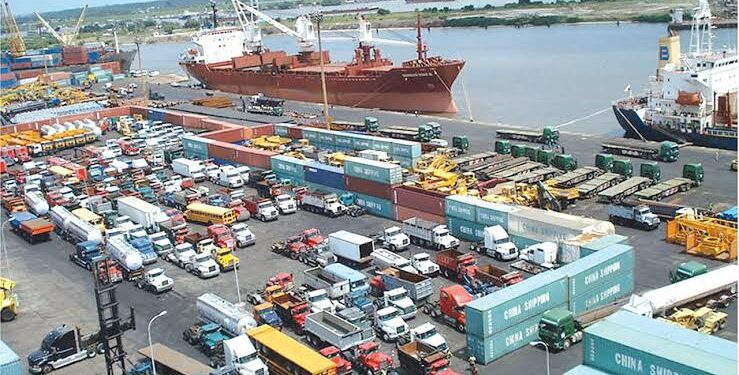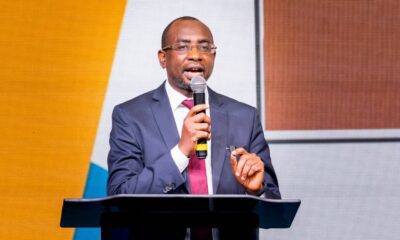Business
Digital skills: NITDA plans to train 1m youths in 18 months — DG
By Ibiyemi Mathew
The Director-General, National Information Technology Development Agency (NITDA), Kashifu Inuwa has revealed that the agency plans to train one million youths within 18 months.
Inuwa disclosed this while delivering a keynote address at the Ogun Digital Summit on the theme ‘Digital Technology: Key to sustainable Future.’
The DG urged the youths to secure their future by investing in digital skills. He encouraged the youths to see Tech as the present and the future of today’s world.
He challenged the youths to take their innovative ideas from conception to impact and commercialise their technologies in order to contribute towards the growth of the Nation’s digital economy.
“Globally, there is a shortage of talents, so, we are creating a mandate to develop a talent strategy because we have a competitive advantage as a country with our vast human and natural resources. Nigeria can seize the opportunity to fill that gap,” the DG said.
The NITDA Boss expressed hopes that some of the participants who were majorly youths of the state will be among the one million developers the agency plans to train in 18 months.
“The government cannot give everyone seed funds or grants at the same time, which is the reason why you need to think outside the box and have something an investor would be interested in, that way, you would have had the needed funds to grow your products and services without the encumbrances of the sometimes tiring government bureaucracies,” he advised.
The DG harped that innovation will help in creating a sustainable future for Nigeria and Nigerians.
“Digital technology provides the source of inspiration for you to be great innovators and solve any problem you can think of,” Inuwa said.
“Data is said to be the new oil, but for me, it is more than oil because data is infinite, the more you use it, the more you create it. So, this is an opportunity for you to tap in to it and so we can achieve the sustainable future we seek,” Inuwa maintained.
Acting on the agency’s mandate, the Director General made a commitment of providing a Digital Centre for St. Peters Anglican Primary School, 1 Isara, Remo North, Ogun State.
Business
Private sector players urge FG to suspend new electricity tariff


…Says it will affect production negatively
By Omolola Dede Adeyanju
Private Sector players in the Nigerian business space under the umbrella group of the Organised Private Sector (OPSN) have urged the Federal Government (FG) to suspend the new electricity tariff.
The Nigerian Electricity Regulatory Commission (NERC) had recently announced an upward review in the electricity tariff for Band A customers generating public outcry.
In a statement by OPSN comprising top Business Membership Organisations (BMOs) MAN, NACCIMA, NECA, NASSI and NASME representing more than 5 million businesses in Nigeria, the association said has taken due notice of the various reforms initiated by the President Bola Tinubu administration to stabilise the economy, enhance human capital development and increase the tax-to-GDP ratio to 15 percent while enhancing fiscal transparency.
“The OPSN has received numerous complaints from its member-companies on the implications of the recent astronomical increase in electricity tariff by the Nigerian Electricity Regulatory Commission (NERC) for Band A customers without the required and proper consultations with the private sector. This sudden exponential increase in the face of inadequate electricity supply, is inimical to the competitiveness of Nigerian products and businesses and will definitely exacerbate the impact of high cost of production,” the Group argued.
Meanwhile, OPSN explained that the astronomical increase is against the MYTO Order referenced NERC/2023/05, which valued the cost-reflective tariff at N114.8/Kwh (determined using exchange rate of N919.39/$1).
“It also does not reflect the current exchange rate reality that has seen the Naira appreciate by 62.95 percent over the dollar in the last one month.
“A closer look at the impact of increase in electricity tariff to N225/kwh (determined using exchange rate of N1463.31/$1) on the cost profile of a medium sized company using 700kw revealed that the firm will need to pay about N1.4b per annum (700 x 225 x 24 x 365)for electricity.
“In China, a similar medium sized company will pay a little over N24m (700 x 94.14 x 24 x 365). Obviously, the new electricity tariff is outrageously higher, when compared with the going rates in countries with significant manufacturing performance.”
The body further enumerated that In the United states of America (USA), United Kingdom, Germany, France, China, India, South Africa, Ghana and Benin Republic, prevailing electricity cost per kilowatt hour are $0.1545, $ 0.3063, $0.53,$0.0573,$0.076, $0.068, $0.0999, $0.123 and $0.195 respectively.
The group further argued that conversion values of the afore-mentioned electricity cost in Naira are N191.38, N379.41, N656.50, N70.98, N94.14, N84.23, N64.53, N152.36 and N125.95 respectively.
“Clearly, with the new tariff of N225/kwh, Nigeria now ranks third after Germany and the United Kingdom on the list of countries with high electricity cost. What is most worrisome with the Nigerian case is the fact that the electricity to be supplied is not adequate.
“Also, the increase is coming on the heels of macroeconomic instability, infrastructure deficits, as well as other supply side constraints limiting the performance of the productive sector. Truth be told, over 65 percent of private businesses, especially manufacturing concerns and SMIs, may be forced to close down due to the high electricity tariff.
“However, in consideration of the above and from compelling primary data and submissions from member-companies, the OPSN noted that it is constrained to state that the more than 200 percent increase in electricity tariff at this difficult time is inimical to the survival of our businesses and would lead to unprecedented downturn in the productive sector of the economy.
“It will have negative trickle-down effects and certainly impoverish Nigerians. The unwarranted increase will worsen the upward swing in inflation, aggravate the pressure on the disposable income of the average Nigerian and lead to closure of many private businesses. The cumulative effect will be an escalation of the current high level of unemployment and insecurity in the country,” it explained.
The group urged the government to have dialogue around the process and methodology of determining electricity tariff as well as jointly agreeing on the transparent mechanism required for tariff setting.
Business
NPA secures $700m facility from Citibank to rehabilitate Apapa, Tin-Can Ports


By Seun Ibiyemi
The Nigerian Ports Authority (NPA) has negotiated a loan of $700million from Citibank to be funded by the UK Export Finance (UKEF), an export credit agency, to rehabilitate the Apapa and Tin-Can Island ports, Lagos.
The Ports Authority has also opened a discussion with another funding agency to secure financing for upgrading of the Eastern Ports including Calabar, Warri, Onne and Rivers Ports as well as the reconstruction of Escravos breakwater.
Speaking in Lagos on Wednesday during the signing of a mandate letter with Citibank Nigeria, Managing Director of the NPA, Mohammed Bello-Koko, said the mandate letter will be sent to the Debt Management Office for final review and approval.
He said the funds are ready and the reconstruction of the Lagos Ports will start soonest even as the NPA perfects plans to sign another mandate letter for the upgrading of the Eastern Ports in about a month.
“In the last two years, the Federal Government has realised the need for us to rehabilitate and reconstruct the ports all over the country. We have been having discussions with multilateral funding agencies who have sent various proposals that we have reviewed.
“What we did is to further discuss with interested parties and we realised it is better to separate the ports in Lagos from the ports in the East, and we are in discussion with other funding agencies to fund the construction of ports outside Lagos,” the NPA MD said.
According to him, the Citibank facility is the cheapest for the Ports Authority because it comes with affordable interest rates.
“Port efficiency is not about automation which we have already begun, it’s also about the physical infrastructure, which must be in place and that’s why we are automating. Automation will naturally bring efficiency, increase revenue and plug leakages,” he added.
Bello-Koko said that the NPA is putting the Port Community System in place, which is a platform that will improve trade facilitation.
“Currently in Nigeria, importers or exporters fill up to 30 to 40 forms for one transaction but the Port Community System will reduce the numbers of forms, human interference and ensure speedy clearance process in or out of the country,” he added.
Earlier, Managing Director of Citibank Nigeria Limited, Ireti Samuel-Ogbu, said the bank is committed to supporting NPA and the Federal Government in bridging infrastructure gaps.
“We are absolutely delighted to be partnering with NPA especially being the collection bank for foreign and local currency port levies. Now, supporting this strategic initiative through export credit financing to upgrade port infrastructure in Tin-Can and Lagos Ports is commendable. However, we are committed in supporting NPA and the Nigerian Government in all its endeavours especially in the infrastructure space,” Ireti Samuel-Ogbu stated.
According to her, Citibank was opportune to have met with Wale Edun, Minister of Finance, a few weeks ago where the port upgrading project was mentioned and he was very delighted about the project.
“Since NPA generates its own foreign revenue, we will be able to support foreign facilities from our resources because this project is very strategic and an important project for NPA and the country at large.
“We are looking forward to this project and we thank NPA for giving us this opportunity and hope to bring this into fruition as soon as possible,” Samuel-Ogbu added.
Business
Blue Economy Ministry to spend N1.35bn on foreign, local trips, vehicle


The Federal Ministry of Marine and Blue Economy will spend a whopping N1 billion on the purchase of vehicles in 2024.
The ministry will also spend a total of N35 million on local and foreign travel in the same year under review.
According to the 2024 Appropriation Act signed into law by President Bola Tinubu, the ministry will spend N10 million on local travel and transport: training; N15 million on local travel and transport: others and N10 million on international travel and transport among others.
However, speaking on the appropriation, the President, National Association of Managing Director of Licensed Customs Agents (NCMDLCA), Lucky Amiwero, said the money for the purchase of vehicles for the ministry should be channelled towards port rehabilitation.
-
Finance3 months ago
Court orders Sen. Victor Umeh to repay N136m bank debt to AMCON
-



 Abuja Update2 months ago
Abuja Update2 months agoUNDP, FG partnership needed to achieve inclusion, equity- Minister
-
Abuja Update4 weeks ago
Banks drive stock market performance with N147bn gain
-





 Infotech3 weeks ago
Infotech3 weeks agoWorld Backup Day: NITDA urges Nigerians to ensure backup of data
-
capital market2 years ago
Rt.briscoe, FBNH, Others halts negative performance of stock market
-



 Health2 weeks ago
Health2 weeks agoImmunisation: FG, GAVI seek synergy with Sokoto Govt.
-
Submission Guidelines3 months ago
CALL FOR SUBMISSIONS: POETRY COLUMN-NND
-
Infotech1 week ago
Forex for Beginners: Unveiling the currency exchange and how to trade it













